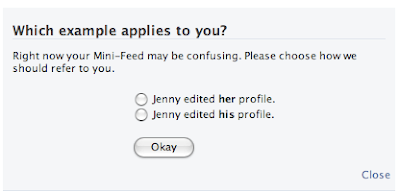|
|
Yesterday, I was ‘defriended’ on Facebook by someone who was once a close friend. This isn’t the first time it’s happened – another ex-friend eliminated me from his virtual network last year, but I was but one small proportion of a mass ‘friend-slaying’ – and I’ve most certainly been defriended by a handful of weak ties and acquaintances – but its the first time I’ve really had a previously close connection visually severed as a result of instigating a virtual confrontation. My angry (and rather public) comment was certainly not unwarranted, as this person has long avoided apologizing for deliberately abandoning me when I most needed friendship, but perhaps a little overdue – the only time I had really confronted her about it was nearly nine months ago, after all.
When I realized that she had not just simply deleted my comment, but defriended me in the process, it felt like a punch to the gut that left me in breathless pain for several hours. Now that the smarting pain has subsided, I’ve started thinking that perhaps defriending is actually quite a practical method, and not necessarily just a passive-aggressive move. It’s amazing how much mental space can get taken up obsessing over past injustices, especially once regular face-to-face contact is lost. Certainly this trend becomes particularly prominent post-college. Facebook and related social media can trigger old pathways we’d normally avoid following, delivering a constant stream of “news” and information about those we’d rather be forgetting.
I love the idea of shaking off old grudges and people who evoke negative energy by simply defriending them, but it conflicts with my belief in forgiveness and my sincere desire not to hurt anyone the way my old friend hurt me yesterday. I’d quit the damn book of faces, but I’m pretty deeply invested in it at this point – it’s how I keep in touch with a huge number of friends, stay informed about upcoming parties and events, share my own stories and things I come across on the ‘net that I know a particular person would enjoy, track down a phone number or address when I need it – and, oh yeah, it’s also a major source of my research.
At the very least, I now understand why the ‘friend-slayer’ I mentioned above did what he did. It must be so very refreshing not to be continually reminded of people who make you feel like shit. And now that I’ve written this post, I’ve come to a sense of closure on the matter, myself, and can look forward to totally getting past someone who never deserved as much mental space as I allotted her.
Maybe I’ll turn giving up social media into a little social experiment. I could probably write a book about that experience!
Or maybe I should just choose my friends more wisely…
This post has been much inspired by fellow Facebook researcher and friend, Jeff Ginger, who wrote an insightful post on the issue: Facebook Friends, False Connection, and Social Norms. Thanks for the chat!
A couple of days ago, the following message popped up on my Facebook homepage and has yet to disappear:

It would seem those who choose not to identify as “his” or “her” has become an issue of some urgency for Facebook. They’ve written a blog post about the issue:
As Facebook grows in other languages, we are learning a lot about what the “Facebook Experience” is like for people around the world. One of the first challenges was getting words that are really long in other languages to fit on the screen properly. Recently, we’ve been figuring out how to deal with a new challenge—grammar. Ever see a story about a friend who tagged “themself” in a photo? “Themself” isn’t even a real word. We’ve used that in place of “himself or herself”. We made that grammatical choice in order to respect people who haven’t, until now, selected their sex on their profile. However, we’ve gotten feedback from translators and users in other countries that translations wind up being too confusing when people have not specified a sex on their profiles. People who haven’t selected what sex they are frequently get defaulted to the wrong sex entirely in Mini-Feed stories. For this reason, we’ve decided to request that all Facebook users fill out this information on their profile. If you haven’t yet selected a sex, you will probably see a prompt to choose whether you want to be referred to as “him” or “her” in the coming weeks. When you make a selection, that will appear in Mini-Feed and News Feed stories about you, but it won’t be searchable or displayed in your Basic Information. We’ve received pushback in the past from groups that find the male/female distinction too limiting. We have a lot of respect for these communities, which is why it will still be possible to remove gender entirely from your account, including how we refer to you in Mini-Feed. We hope this change will make the Facebook experience even better across the world. Let us know if you have any thoughts about this on our suggestions page. Naomi is a Product Manager at Facebook.
Apparently it’s an issue of being lost or, as the case may be, misconstrued in translation.
I didn’t select a sex, just clicked ‘close’; confusion regarding such things has a salubrious effect on consciousness, methinks.
I knew the day would come: I’ve received my first real robot-spam on Facebook just a few minutes ago. Funnily enough, I was just this evening writing about Facebook’s slippery history with fucking over it’s core users- ever since the News Feed was introduced in the fall of 2006, followed by the site opening its doors to everyone, including third-party developers and advertisers, and of course we can’t forget Project Beacon- in my thesis.
The Spam:

Mika, a friend from high school, had been going through a “Facebook-identity crisis” over the past couple of days; each time I had logged into Facebook during this time, the “Recently Updated” tab indicated that Mika had changed several elements of his profile. Often, his changes would include a reference to the Facebook medium itself. At one point, his profile was exceedingly honest and somewhat vulnerable, his “About Me” declaring himself to be a “nice, open-minded guy,” inviting others to talk to him and get to know him more. However, this brief display of stark honesty was quickly deleted, to be replaced by a more minimal, utilitarian profile.
Curious, I sent him an IM (instant message) and struck up a conversation. Though he admitted to occasionally “giving Facebook a shot,” in assessing these attempts at honest self-portrayal he put himself in the position of someone else viewing his profile and came to the conclusion that “I would think I’m a loser.” He noted the inadequacy of Facebook profiles for truly getting to know others, particularly those he had recently met but had yet to develop a good friendship with, and expressed his desire to be able to connect “directly to people’s brains.”
His observations, spurred by his experiences with Facebook, can be applied to virtually every medium of human communication- beginning with language itself. As the early 20th-century philosopher-poet T.E. Hulme puts it: “Language is by its very nature a communal thing; that is, it expresses never the exact thing but a compromise—that which is common to you, me, and everybody.” From face-to-face conversations to modern technologies of communication, our experiences of the world are mediated by language. Through language, humans develop mutually understood symbols by which we define ourselves, our worldviews, and reality itself.
The struggle to effectively communicate one’s “true” self is not particular to online social networking; rather, the tension between one’s inner sense of self and outward portrayal of that self had been a subject of concern in Western culture long before the advent of the Internet. From the dawn of recorded language, Plato spoke of the “great stage of human life.” If, as Shakespeare mused, “All the world is a stage, and all the men and women merely players,” then what happens when the curtains close and we go backstage? In The Presentation of Self in Everyday Life, Erving Goffman (1956) elaborated upon this dramaturgical approach in crafting a sociological theory that has come to be known as “symbolic interactionism.” Once backstage, “the impression fostered by the presentation is knowingly contradicted as a matter of course (112).” From the symbolic interactionist perspective, one performs a certain role on the public stage that is often subverted in the private sphere (“backstage” . This private sphere allows for a more “truthful” performance of self, but is nevertheless still a performance tailored to a specific audience. The question then becomes: may one understand the “true self” when no audience is present? . This private sphere allows for a more “truthful” performance of self, but is nevertheless still a performance tailored to a specific audience. The question then becomes: may one understand the “true self” when no audience is present?
Paul Ricoeur, an eminent scholar in the field of hermeneutics and phenomenology, challenges the notion that the self is transparent to itself. Rather, he theorizes that the hermeneutic self is revealed to that self through the ‘other’- immediately and directly through two interlocuters. Furthermore, this face-to-face, intersubjective encounter is a relation that is “invariably intertwined with various long intersubjective relations, mediated by various social institutions, groups, nations and cultural traditions (Kearney 2004: 4).” One continually attempts to define the self as an individual with a unique “personality,” however this process is itself co-constructed through one’s everyday interactions with others as well as the subjective appropriation of various cultural markers of identity. From this perspective, online social networks mirror the process by which individuals construct their identities by extending interpersonal communication and providing fields in which they may articulate their cultural tastes and group affiliations.
Despite the evidence that all experiences are mediated and that the “self” is co-constructed, I have time and again encountered the pervasive belief that experiences with online social networking diminish the quality of interpersonal communication and fail to accurately portray one’s identity. This perceived disconnect may be attributed to a number of factors.
Firstly, computer-mediated communication reduces the kind of social cues we frequently rely on in face-to-face communication (such as gesture and intonation), thereby increasing the likelihood for miscommunication.
Secondly, effective computer-mediated communication demands not only literacy and the ability to effectively communicate through written text, but also a certain level of “fluency” with the specific language of the online environment in which one is participating.
Thirdly, popular online social networks pose the threat of enmeshing myriad social contexts, effectively challenging the distinctions between public and private. In these cases, the protective boundaries between the various roles we perform “onstage” and those we perform “backstage” become dangerously blurred.
Finally, because these audiences are often invisible, we may come to know more about another through their online personas than through “natural” face-to-face interactions, and vice versa. In such cases, the “self” is projected rather than co-constructed, substantially altering the process through which we come to know another. The awkwardness of this new social phenomenon is humorously portrayed in a comic I recently came across:

Yesterday, the Facebook team announced their plan to help users battle “application spam,” describing recently-added features they’ve added that many of you should find pretty appealing. It’s a good thing, because the bevy of e-mails and invitations I’ve received in the past few months has been a real turn-off for the vast majority of “veteran” users. High school students and MySpace converts enthusiastically SuperPoke one another, adorn each others’ profiles with “Graffiti,” and rank the “Hotties” amongst their Friends (capitalized because Friendship on online social networks is quite distinct from friendship). Other Internet enthusiasts and thinkers promote charitable organizations, ask Questions of their profiles’ visitors, and incorporate their various online presences (on MySpace, SecondLife, Twitter, etc . However, those who’ve been with Facebook since the beginning (older college students and recent alumni) have a very different relationship with the site. Sure, we may SuperPoke and turn you into a vampire every once and awhile, but for the most part, Facebook serves to keep in touch with college friends scattered across the globe, see what’s come of our high school classmates, take nostalgic journeys through the hundreds of pictures tagged with our names (de-tagging when appropriate), and keep our various networks of old friends informed about our post-college lives. . However, those who’ve been with Facebook since the beginning (older college students and recent alumni) have a very different relationship with the site. Sure, we may SuperPoke and turn you into a vampire every once and awhile, but for the most part, Facebook serves to keep in touch with college friends scattered across the globe, see what’s come of our high school classmates, take nostalgic journeys through the hundreds of pictures tagged with our names (de-tagging when appropriate), and keep our various networks of old friends informed about our post-college lives.
When Facebook began allowing anyone and everyone to join the site back in 2006 and added the News Feed, thousands of college students virulently protested: some quit the site completely, many joined Facebook Groups protesting the move, and practically everyone I know complained. In response, Facebook added a slew of privacy features, such as Limited Profiles (which I use liberally) and News Feed controls. With the advent of Applications, a similar wave of protest made itself evident through such groups as “fuck off… i don’t want to be a pirate/vampire/werewolf/zombie.” Nevertheless, the number of Application exponentially increased, growing increasingly manipulative and tricksy. Many applications, particularly quizzes, practically force users to invite friends in order to see their results, resulting in the rise of groups protesting viral applications. Once again, Facebook has responded.
Here’s a run-down of the new ways you can control your “Application-Spam:”
1. Block Applications instantly. Now, when you get an invitation for the latest useless, viral Application, you can check “Block Application” directly within the invite. Nevermore, you vampires and zombies! Go bite someone who cares!
2. Clear all “Requests.” I’m not the only one who simply ignores every invitation sent my way, allowing them to build up steadily on my homepage (currently, I have 64 pending invitations). Why spend the energy rejecting every single invitation? You can be sure I’ll be clicking the “Ignore All” button (located on the “Requests” page, at the top) as soon as I finish this post.
3. Applications must now inform you ahead of time if you’re obligated to invite Friends in order to get information or access content. It’s so very irritating to spend 15 minutes filling out a quiz, only to be told afterwards that you must invite Friends to see your results. Sneaky Applications are no longer allowed to do this.
4. Forcing users to send Invitations is no longer allowed. Did you install an Application, only to find yourself forced to send invitations to your Friends in order to use it? Report it by clicking “This Application is forcing me to invite friends.”
5. Opt-out of e-mail sent by Applications. New Requests will automatically present you with this option, and you can control e-mail sent by Applicatios you’ve already installed by going to the “Edit Applications” page.
6. Help Facebook weed out the garbage from the good stuff. Getting a lot of e-mails from one of your Applications? Mark it as spam, and Facebook will take note. Did an Application break the rule I mentioned in #3? Go to the App’s “About” page and report it to Facebook.
Though it took them awhile to get around to it, I must commend Facebook on once again listening to their users and providing tools for protection against this latest version of viral marketing. Now to spread the news and help empower you Facebookers out there!
The following was initially a comment on danah boyd’s recent post discussing Facebook’s “slippery slope” of betraying its users, most recently with Project Beacon. Please share your thoughts if you have them!
“Trusting Facebook users” are generally older folk- I think they’re more open to publicizing their online profiles because they’re seeking to make connections, they’re gaining from the public exposure and excited by all the novel possibilities. My ethnography of social networking sites primarily re/presents the voices of college students- particularly veteran Facebook users. The site started out as being a great little niche environment, so people could exchange intimate messages and upload photos from that crazy party where everyone was on a ton of drugs and so on. Then it opened up, everyone was pissed, and that’s when attitudes toward Facebook started to shift.
Most first-generation Facebookers have some degree of distrust/disgust for the site, often a great deal of it. Yet they continue to use it because it’s become so firmly integrated into campus social life- it’s a way to easily invite people to parties and share photos from said parties, to visually organize one’s social network and keep track of alumni and old high school buddies, to find out the sexuality or relationship status of that boy you’ve been admiring from afar. It’s crucial. If you’re not on Facebook, you’re going to be somewhat out of the loop.
Such important social practices generally take precedence over the egregious invasions of privacy that most are highly suspicious of. The trend is not abandoning Facebook- it’s far too useful. However, the site’s reputation is definitely tainted, and some Facebookers are using the site to form or join groups that promote awareness of Facebook’s privacy policies and petition for change. Most, however, are simply becoming more savvy and protective of their online personas; it’s become increasingly common for me to be unable to access the profiles of those I’m not friends with because of that practice. Others have simply taken to deleting much of their profiles, leaving just an e-mail address, a witty or ironic comment, and maybe a funny picture. There’s also a huge trend to apathetically accept that nothing can be done about it, much like how a lot of young people feel about our government.
Again, these are just observations of the changing attitudes among a specific subset of Facebook users. They know what’s going on (though I would say that only the Tech-savvy blog-readers have even heard about Project Beacon- but they know their information is being used for capitalist endeavors), they’re disgruntled that so much of what they do on Facebook is publicly broadcast and forever archived. Regardless of how they talk about it, however, they’re still using it regularly for everyday social practices. For many, it’s become as habitual to check Facebook as it is to check e-mail.
For those of you who think “Facebook Activism” is only good for whining about the company’s latest invasions of your privacy, or expressing support for Stephen Colbert’s “presidential race,” check it:
Over 270,000 Facebook members, mostly Central American youths, have joined a group called “One Million Voices Against FARC,” which was established one month ago. The group leaders organized a rally, using Facebook as a means to gather support both within Columbia as well as globally. This past Monday, between 500,000 and 2 million Columbians marched in the streets, with thousands joining them in over 133 countries worldwide.
FARC, which in English stands for the Revolutionary Armed Forces of Columbia-People’s Army, considers itself to be a guerilla movement for Columbian communism. Most of the rest of the world, including Columbia, prefers the term “terrorist organization”. The movement is specifically geared toward halting the ubiquitous kidnapping tactics employed by FARC, claiming that thousands have been wrongly imprisoned by the group for over a decade.
Nevertheless, some Columbians feel that the movement may serve only to polarize the country. Though they acknowledge the importance of standing up to unethical practices such as kidnapping, protesting FARC itself is a bit more nuanced. From The Christian Science Monitor:
“While few Colombians support the Marxist insurgent army that has been fighting the Colombian state for more than 40 years, many people are uncomfortable with the message of Monday’s rally. They would prefer a broader slogan against kidnapping and in favor of peace and of negotiations between the government and the rebels to exchange hostages for jailed rebels. The leftist Polo Democratico Party said it will hold a rally in Bogotá in favor of a negotiation but would not march. Some senators say they will march against Venezuelan President Hugo Chávez, and other participants say they will be marching in favor of Colombian President Alvaro Uribe.”
The group’s discussion board is probably the best insight into the myriad issues and sentiments the struggle evokes amongst Central and South American youth, reflecting struggles against racism, classism, and corrupt governments. Thanks to Claire-bear for keeping her finger on the pulse of Free Speech Radio!
As the tech world continues to grow wild for Facebook, the veteran users in my midst- college students- continue to grow indifferent, even annoyed- or so their group discourse would have me believe. “The applications were pretty fun at first,” said one energetic, people-loving friend, “I like throwing food at my friends and turning them into zombies… but it got old real fast.” “They’re stupid, they’re annoying, I just really don’t care at all anymore,” said another friend, who’d spent his past semester abroad, “I mean, I guess it’s useful for keeping in touch with people you don’t care enough about to e-mail.”
“Well, I care so little that I let her,” Dave points a finger at his girlfriend, “go in and change my whole profile around. It’s ridiculous, and I haven’t even changed it back.” They giggle for awhile.
“There are some useful applications,” I point out.
“Well, there’re so many of them, I don’t feel like sifting through all of that crap. Facebook’s turning into MySpace.”
At the same time, I’ve found that my friends on Facebook continue to be highly active, having become skilled at interacting with the more useful features of the site. 25% of the most recent 50 emails in my inbox are Facebook notifications of some sort- generally, event listings, friend requests, wall messages, and pokes. These are some of the ways in which we attempt to connect to one another through forming and maintaining relationships and collective cohesion, digitally.
My conclusion? It’s just not “cool” to like Facebook- one is better off being critical- but many of us depend on it in some way or another as a way of maintaining social bonds. We’ve grown addicted.
I ran across an interesting thread on Tribe.net yesterday entitled “What is Technoshamanism?” You can read it here, but in a nutshell, the respondees described technoshamanism as a means of uniting the past and the present, or the spiritual and the technological. From dancing around a bonfire to the beat of the drums, to dancing all night long to electronic trance music, the end goal is a spiritual connection to the universe that dates back to the beginning of humankind’s time on this planet.
I have to simply marvel, at times, how meticulously the system of Facebook is run. Nothing is deleted, all is stored. Upon deleting my Facebook account, I learned that the moment I logged in again, my entire account- the photos, the messages, the wall posts- would be rekindled from my momentary lapse of Facebook identity, as if I had taken a vacation… which, admittedly, I had.
The new frontier for individualism, the virtual frontier, is at this point still an open one. However, as this sphere becomes increasingly dominated by large corporate networks, understanding the illusory nature of agency is critical. John Barlow’s Declaration for the Independence of Cyberspace has never been more poignant.
It is the first night living alone – this one, right now. Telling myself I need to take a break from the carrying, the unpacking, the arranging of my possessions in an aesthetically pleasing manner, I hop onto the internet to check messages. A familiar name pops out at me from a Facebook notification- a dear friend who’d spent the entirety of the past year in Spain. She writes to tell me she’ll be at Wesleyan on Tuesday, and I go from alone in the glow of the monitor to basking in the glow of love, instantly.
I click the ‘Home’ button, and scroll through my News Feed. A tiny heart appears at the bottom of the screen- a man who’d led a Buddhist retreat had a new girlfriend! And they’d hooked up in 2006 and it was “fabulous”. This is way better than tabloids, because I actually sorta know this guy. I mean, we’re Facebook Friends.
MySpace is plastered with Dane Cook. MySpace is for bros. My 19 year old cousin assaults the ears of visitors to her profile with screamo and concludes her welcome message with “i probably don’t like you.” All of my friend requests are from electronic musicians. I do enjoy electronic music, by and large. A friend of mine who recently began producing tracks just joined MySpace, and already has over 400 friends. I asked if he’d been spending a lot of time “friending” MySpacers, and he replied, “well, half of them have friended me”. His Comments board is plastered with psychedelic images, a few of them animated. There is an image of a woman whose moniker contains the word “suicide,” holding a pair of black panties beneath a caption that reads “Thanks for the add! xoxo”.
That is all.
|
|







 . This private sphere allows for a more “truthful” performance of self, but is nevertheless still a performance tailored to a specific audience. The question then becomes: may one understand the “true self” when no audience is present?
. This private sphere allows for a more “truthful” performance of self, but is nevertheless still a performance tailored to a specific audience. The question then becomes: may one understand the “true self” when no audience is present?